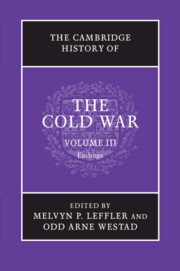Book contents
- Frontmatter
- 1 The Cold War and the intellectual history of the late twentieth century
- 2 The world economy and the Cold War, 1970–1990
- 3 The rise and fall of Eurocommunism
- 4 The Cold War and Jimmy Carter
- 5 Soviet foreign policy from détente to Gorbachev, 1975–1985
- 6 Islamism, the Iranian revolution, and the Soviet invasion of Afghanistan
- 7 The collapse of superpower détente, 1975–1980
- 8 Japan and the Cold War, 1960–1991
- 9 China and the Cold War after Mao
- 10 The Cold War in Central America, 1975–1991
- 11 The Cold War and southern Africa, 1976–1990
- 12 The Gorbachev revolution and the end of the Cold War
- 13 US foreign policy under Reagan and Bush
- 14 Western Europe and the end of the Cold War, 1979–1989
- 15 The East European revolutions of 1989
- 16 The unification of Germany, 1985–1991
- 17 The collapse of the Soviet Union, 1990–1991
- 18 Science, technology, and the Cold War
- 19 Transnational organizations and the Cold War
- 20 The biosphere and the Cold War
- 21 The Cold War and human rights
- 22 The Cold War in the longue durée: global migration, public health, and population control
- 23 Consumer capitalism and the end of the Cold War
- 24 An ‘incredibly swift transition’: reflections on the end of the Cold War
- 25 The restructuring of the international system after the Cold War
- Bibliographical essay
- Index
Bibliographical essay
Published online by Cambridge University Press: 28 September 2010
- Frontmatter
- 1 The Cold War and the intellectual history of the late twentieth century
- 2 The world economy and the Cold War, 1970–1990
- 3 The rise and fall of Eurocommunism
- 4 The Cold War and Jimmy Carter
- 5 Soviet foreign policy from détente to Gorbachev, 1975–1985
- 6 Islamism, the Iranian revolution, and the Soviet invasion of Afghanistan
- 7 The collapse of superpower détente, 1975–1980
- 8 Japan and the Cold War, 1960–1991
- 9 China and the Cold War after Mao
- 10 The Cold War in Central America, 1975–1991
- 11 The Cold War and southern Africa, 1976–1990
- 12 The Gorbachev revolution and the end of the Cold War
- 13 US foreign policy under Reagan and Bush
- 14 Western Europe and the end of the Cold War, 1979–1989
- 15 The East European revolutions of 1989
- 16 The unification of Germany, 1985–1991
- 17 The collapse of the Soviet Union, 1990–1991
- 18 Science, technology, and the Cold War
- 19 Transnational organizations and the Cold War
- 20 The biosphere and the Cold War
- 21 The Cold War and human rights
- 22 The Cold War in the longue durée: global migration, public health, and population control
- 23 Consumer capitalism and the end of the Cold War
- 24 An ‘incredibly swift transition’: reflections on the end of the Cold War
- 25 The restructuring of the international system after the Cold War
- Bibliographical essay
- Index
Summary
The bibliographical essays in the three volumes of the Cambridge History of the Cold War aim at being selective and critical overviews of the literature available in each subfield of historical investigation. The entries are written by the authors of the chapters in the main text, with additions, deletions, and crossreferences suggested by the editors. Readers may want to look at the bibliographic entries in more than one volume to get an overview of the literature on a particular issue or region.
The Cold War and the intellectual history of the late twentieth century
There exists no single volume on the intellectual history of the last third of the twentieth century, or even one that would convincingly cover the postwar period in Western Europe or the United States. A useful collection of essays on political thought in the twentieth century as a whole is Terence Ball and Richard Bellamy (eds.), The Cambridge History of Twentieth-Century Political Thought (Cambridge: Cambridge University Press, 2003); also still useful is Karl Dietrich Bracher, The Age of Ideologies: A History of Political Thought in the Twentieth Century (New York: St. Martin’s, 1984). Books that successfully weave together accounts of European political history and judgments on some of the major developments in European political thought are Tony Judt’s Postwar: A History of Europe since 1945 (London: Penguin, 2005) and Mark Mazower’s Dark Continent: Europe’s Twentieth Century (London: Penguin, 1998); still useful is George Lichtheim, Europe in the Twentieth Century (London: Phoenix, 2000).
- Type
- Chapter
- Information
- The Cambridge History of the Cold War , pp. 557 - 602Publisher: Cambridge University PressPrint publication year: 2010

